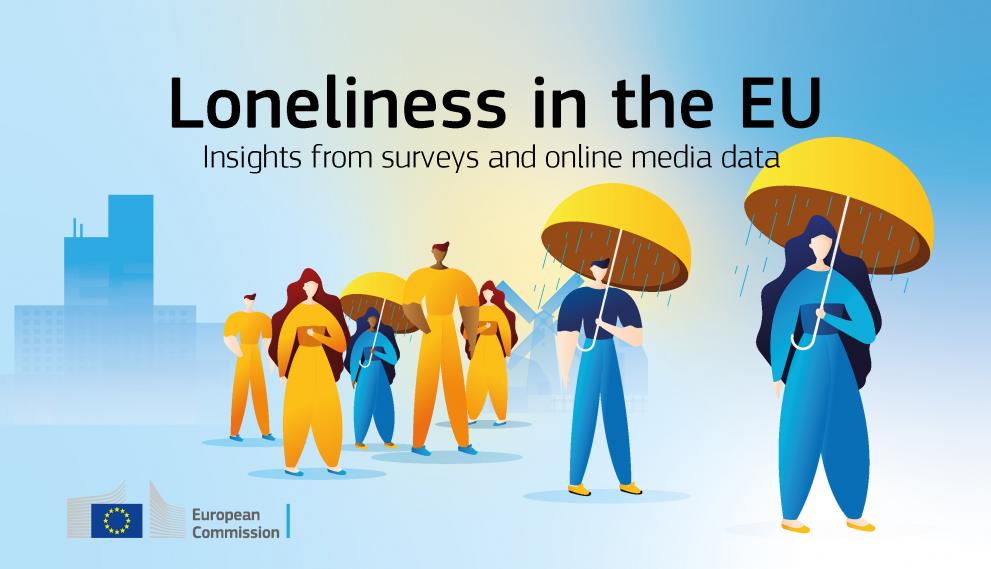
One in four EU citizens reported feeling lonely most of the time during the first months of the coronavirus pandemic, according to Eurofound survey data analysed in a new report from the JRC.
This is more than double the levels of loneliness reported in a similar survey conducted in 2016. And it is young people most affected by social distancing and quarantining measures.
The share of 18-25 year olds who reported feeling lonely was four times higher in April-July 2020 than in 2016. Among other age groups, reported loneliness still increased, but not to the same extent.
The report “Loneliness in the EU: Insights from surveys and online media data” explores how loneliness evolved during the pandemic as compared to previous years, for Europeans of all ages. It also shows how public interest in the issue has grown.
The report contains the first ever EU-wide analysis of online media coverage of loneliness, showing that reporting on loneliness also doubled during the pandemic.
Vice-President for Democracy and Demography, Dubravka Šuica, said: “The coronavirus pandemic has brought problems like loneliness and social isolation to the fore. These feelings already existed, but there was less public awareness of them. With this new report, we can start to better understand and tackle these problems. Together with other initiatives, like the Green Paper on Ageing, we have an opportunity to reflect on how to build together a more resilient, cohesive society and an EU that is closer to its citizens.”
Commissioner for Innovation, Research, Culture, Education and Youth, Mariya Gabriel, added: “Loneliness is a challenge that is increasingly affecting our young people. But to address any challenge effectively we first need to understand it. Our scientists at the Joint Research Centre are providing valuable insights into loneliness and how people have been impacted by the pandemic. This new report gives us a baseline for broader analysis, so that loneliness and social isolation can be fully understood and addressed in Europe.”
The report also includes a detailed analysis of initiatives to tackle loneliness in 10 EU Member States.
In some of these Member States, there is an increased awareness of the phenomenon, as well as a variety of initiatives to tackle it. Different solutions are being proposed and implemented, usually at local or regional levels.
This includes initiatives such as dedicated telephone numbers, community building projects, and robots to assist with lonely people.
The report and its findings are the first step of a broader work in the framework of a collaboration between the European Parliament, the European Commission Directorate-General for Employment, Social Affairs & Inclusion, and the JRC.
The project will include a new EU-wide data collection on loneliness, to be carried out in 2022, and the establishment of a web platform to monitor loneliness over time and across Europe.
Main findings
In addition to the overall findings on increased feelings of loneliness, particularly among young people, and the increased media coverage of the issue in the EU, the report also highlights that:
- Being single is associated to a higher impact of social distancing measures on loneliness. The share of people living alone who reported feeling lonely grew by more than 22 percentage points compared with 2016 levels. For those living with a partner and/or children, the increase was 9 percentage points;
- Loneliness is affecting all regions of Europe, with reported loneliness levels of between 22% and 26% across regions. This is in contrast to pre-pandemic times, when loneliness was lowest in northern Europe (6% reported feeling lonely in 2016);
- One third of media reporting on loneliness and social isolation discusses its relation to health. Media reporting on loneliness also mentions its economic impact, but less frequently (10% of articles). This reporting also focuses mainly on the impact on young people and women;
- Both media reporting and awareness of the issue of loneliness varies widely from EU Member State to Member State. In some countries media reporting is extensive, while in others it is very low or even non-existent. The same is true for local and national authorities taking measures to tackle the problem.
Background
Loneliness and social isolation are harmful to mental and physical health, and have significant consequences for social cohesion and community trust. They are becoming increasingly recognised as public issues that need to be addressed with effective policy interventions.
The coronavirus pandemic has dramatically reshaped the lives of Europeans. Measures adopted to contain the spread of the virus have prompted public discussions about the unintended side effects of such arrangements.
The current public debate represents an opportunity to highlight a problem that has often been unacknowledged or treated as a taboo.
It is in this context that Commission Vice-President Dubravka Šuica asked the JRC for the latest scientific evidence on loneliness and social isolation in the EU. The publication of the report follows a meeting of the Vice-President with Tetsushi Sakamoto, Japan’s first Minister for Loneliness on 20 July, where both sides agreed to share knowledge and measures on tackling the problem.
Related Content
JRC report - Loneliness in the EU. Insights from surveys and online media data
COVID-19 and counter-measures both detrimental to mental health
Details
- Publication date
- 26 July 2021
